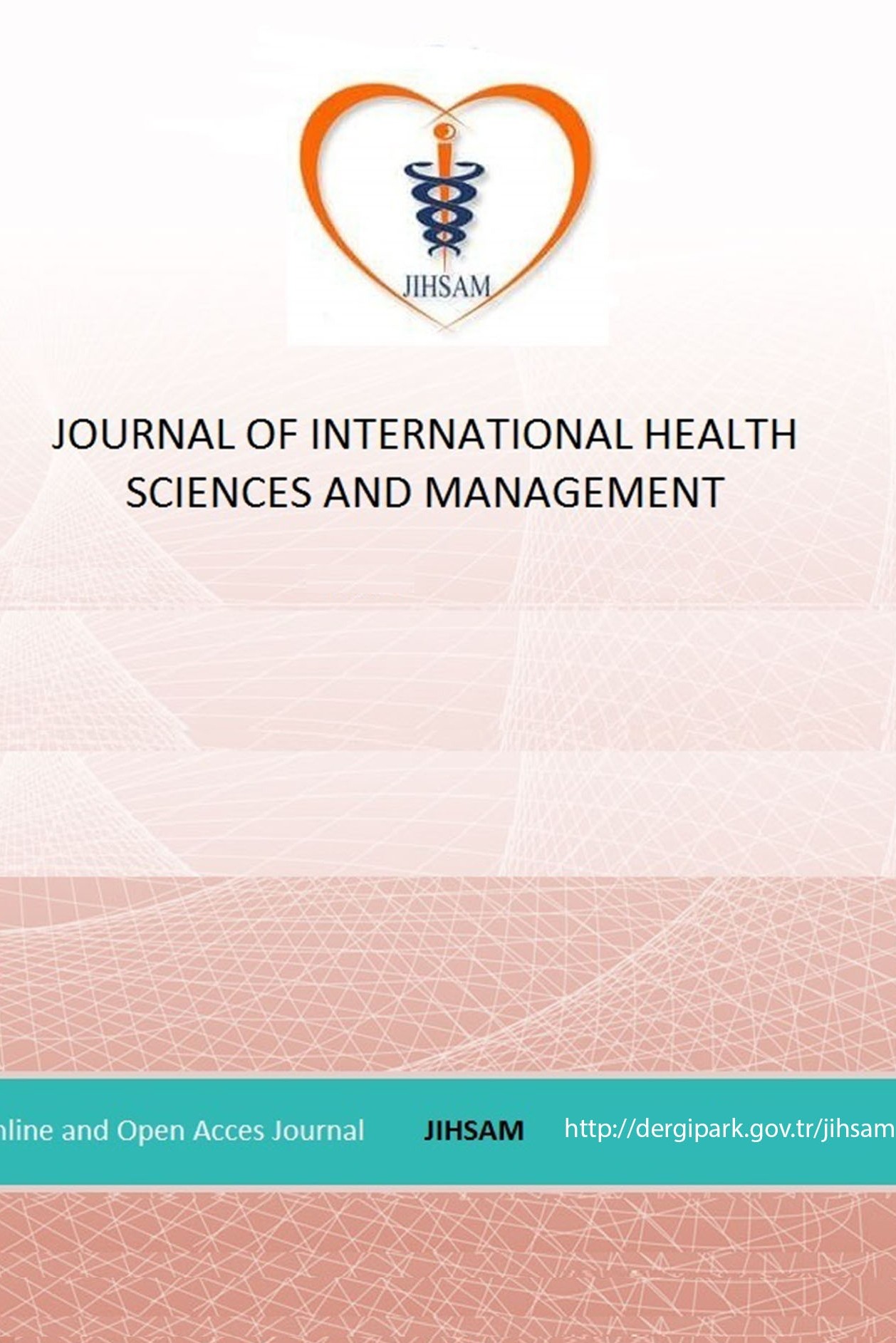The Role of Personal Knowledge Management on the Effects of Self-Leadership to Transformational Leadership: A Study on the Public Healthcare Managers
The Role of Personal Knowledge Management on the Effects of Self-Leadership to Transformational Leadership: A Study on the Public Healthcare Managers
Self-Leadership, Transformational Leadership, Personal Knowledge Management Healthcare Managers, Mediating Role,
___
- Anderson, J. S., & Prussia, G. E. (1997). The self-leadership questionnaire: Peliminary assessment of construct validity. The Journal of Leadership Studies, 4(2), 119-143.
- Avery, S., Brooks, J., Brown, J., Dorsey, P., & O'Conner, M. (2001). Personal Knowledge Management: Framework for Integration and Partnerships. ASCUE Proceedings Book.
- Bass, B. M. (1985). Leadership and performance beyond expectations. New York, NY: Free Press.
- Bass, B. M., & Avolio, B. J. (1990). Developing Transformational Leadership Beyond. Journal of European Insdustrial Training(5), 21-27.
- Bass, B., & Riggio, R. (2006). Transformational Leadership. Mahwah, New Jersey: Lawrence Erlbaum Associates.
- Burns, J. M. (1978). Leadership. New York: Harper and Row.
- Carless, S. A., Wearing, A. J., & Mann, L. (2000). A Short Measure of Transformational Leadership. Journal of Business and Psychology, 14(3), 389-405.
- Chang, S. H., Shu, Y., Lin, Y. H. ve Wang, C. L. (2019). “I Believe”, “I Think”, Then “I Will”? Investigating the mediator role of ethical judgment between internet ethical self-efficacy and ethical behavioral intention. Computers in Human Behavior, 101, 387-393.
- Creswell, J. W., & Creswell, J. D. (2018). Research design: qualitative, quantitative, and mixed methods approaches. Fifth edition. Thousand Oaks, California: SAGE Publications, Inc.
- Downton, J. V. Jr. (1973). Rebel Leadership. New York, NY: Free Press.
- Efimova, L. (2005). Understanding Personal knowledge management: A Weblog case. Enschede: Telematica Instituut.
- Frand, J., & Hixon, C. (1999). Personal Knowledge Management: Who, What, Why, When, Where, How?
- Houghton, J. D., & Neck, C. P. (2002). The revised self-leadership questionnaire: Testing a hierarchical factor structure for self-leadership. Journal of Managerial Psychology, 18(2), 31-41.
- Houghton, J. D., Dawley, D., & DiLiello, T. C. (2012). The Abbreviated Self-Leadership Questionnaire (ASLQ): A More Concise Measure of Self-Leadership. International Journal of Leadership Studies, 7(2), 216 – 232.
- Jones, W., & Teevan, J. (2007). Personal information management. University of Seattle, WA: Washington Press.
- Karasar, N. (2018). Bilimsel Araştırma Yöntemi (31. b.). Ankara: Nobel Yayınevi.
- Klarner, P., Sarstedt, M., Hoeck, M. & Ringle, C. M. (2013). Disentangling the effects of team competences, team adaptability, and client communication on the performance of management consulting teams. Long Range Planning, 46(3), 258-286.
- Manz, C. C. (1986). Self-leadership: Toward an expanded theory of self-influence processes in organizations. Academy of Management Review, (11), 585-600.
- Muhammed, S., Doll, W. J., & Deng, X. (2011). Impact of Knowledge Management Practices on Task Knowledge: An Individual Level Study. International Journal of Knowledge Management 7(4), 1-21.
- Podsakoff, P., MacKenzie, S., Moorman, S., & Fetter, R. (1990). Transformational leader behaviors and their effects on followers' trust in leader, satisfaction, and organizational citizenship behaviors. Leadership Quarterly, 1(2), 107-142.
- Polanyi, M. (1958). Personal Knowledge: Towards a Post Critical Philosophy. London: Routledge & Kegan Paul Ltd.
- Posner, B. Z., & Kouzes, J. M. (1990). Leadership Practices: An Alternative to the Psychological Perspective. Measures of Leadership. Ed. Clark, K. E. & Clark M. B., West Orange, NJ: Leadership Library of America, 205-15.
- Şahin, F. (2015). Kendi Kendine Liderlik Ölçeği Kısa Formunun Benzeşim, Ayrışım ve Yordayıcı Geçerliliği. İş ve İnsan Dergisi, 2(2), 91-104.
- Sarstedt, M., Ringle, C. M., Smith, D., Reams, R. ve Hair Jr, J. F. (2014). Partial least squares structural equation modeling (PLS-SEM): A useful tool for family business researchers. Journal of Family Business Strategy, 5(1), 105-115.
- Tabak, A. S. (2013). Öz-Liderlik Ölçeğinin Türkçeye Uyarlanması Çalışması. Bilig, 67, 213-246.
- Toduk, Y. (2014). 2023 Lideri Dijital Çağın Liderlik Sırları. İstanbul: Doğan Yayıncılık.
- Tseng, F., & Fan, Y. (2011). Exploring the Influence of Organizational Ethical Climate on Knowledge Management. Journal of Business Ethics(101), 325-342.
- VanSandt, C. V., & Neck, C. P. (2003). Bridging Ethics and Self-Leadership: Overcoming Ethical Discrepancies Between Employee and Organizational Standards. Journal of Business Ethics, 43, 363-387.
- Weber, M. (1947). The theory of social and economic organization. New York: Free Press.
- Wright, K. (2005). Personal knowledge management: supporting individual knowledge worker performance. Knowledge Management Research & Practise, 3(3), 156.
- Yang, Z., Tian, Y., Fan, Y., Liu, L., Luo, Y., Zhou, L. ve Yu, H. (2019). The mediating roles of caregiver social support and self-efficacy on caregiver burden in parkinson's disease. Journal of Affective Disorders, 256, 302-308.
- Zuber-Skerritt, O. (2005). A Model of Values and Actions for Personal Knowledge Management. Journal of Workplace Learning, 17(1/2), 49-64.
- Yayın Aralığı: Yılda 2 Sayı
- Başlangıç: 2015
- Yayıncı: Sedat BOSTAN
Çiğdem Müge HAYLI, Nazım BERATLI, Mira GÖKDOĞAN
THE EFFECT OF THE ECONOMIC CRISES AFTER 2000 ON PRIVATE HOSPITALS IN TURKEY
Amira BOSHRA, Sharifa ALASİRY, Elsadig Y. MOHAMED, Sawsan ABDALLA, Mehrunnisha AHMED, Faizan KASHOO
Smoking Cessation Struggle in Online Communities: A Netnographic Analysis of Kadinlarkulubu.com
M. Salih GÜRAN, Gizem MERCİMEK
Şeyma KALKUZ, Fatma YÜKSELİR ALASIRT, Figen DIĞIN, Yeliz MERCAN
Seda Tuğba BAYKARA MAT, Çisem BAŞTARCAN, Okan Anil AYDİN, Kadir ÇALIŞKAN
